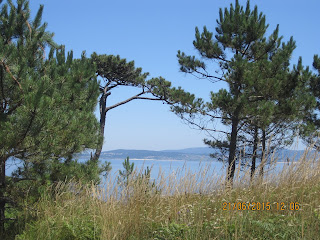And Greece is seriously heading for meltdown. Imagine none of the hole-in-the-wall cash machines in your town, no, your whole country, just not working! What do you do when you have spent up the cash in your pocket. Presumably the credit card system doesn't work properly either,
Ancient civilisations are falling apart!
 It's a good job poolside life is still carrying on in a stable fashion here in Pontevedra, or rather, Poio, where we are now spending a couple of nights at our friend Colin's house. Golden girls are working in getting there tan even more evenly golden, children are leaping into the water and playing a kind of watery blind-man's buff where one child closes his eyes and calls out, "Marco", to which the others respond, "Polo" and the first has to try to catch them, and grandfathers are still teaching the little kids to swim.
It's a good job poolside life is still carrying on in a stable fashion here in Pontevedra, or rather, Poio, where we are now spending a couple of nights at our friend Colin's house. Golden girls are working in getting there tan even more evenly golden, children are leaping into the water and playing a kind of watery blind-man's buff where one child closes his eyes and calls out, "Marco", to which the others respond, "Polo" and the first has to try to catch them, and grandfathers are still teaching the little kids to swim. This after Phil's eventual success at the Sanxenxo tournament. After working manfully to defeat the oldest player in the tournament, a grand old man of about 85, in the last round, Phil scored enough to put him in line for a prize. Not just any bold veteran's prize, which he has won before now, but the prize for the "Superveterano", winning him not only a cash prize (a contribution to our hotel bill) but also a boat.
Okay, it's only a pot boat but it is really quite charming, undoubtedly the best-looking trophy he has ever won.















